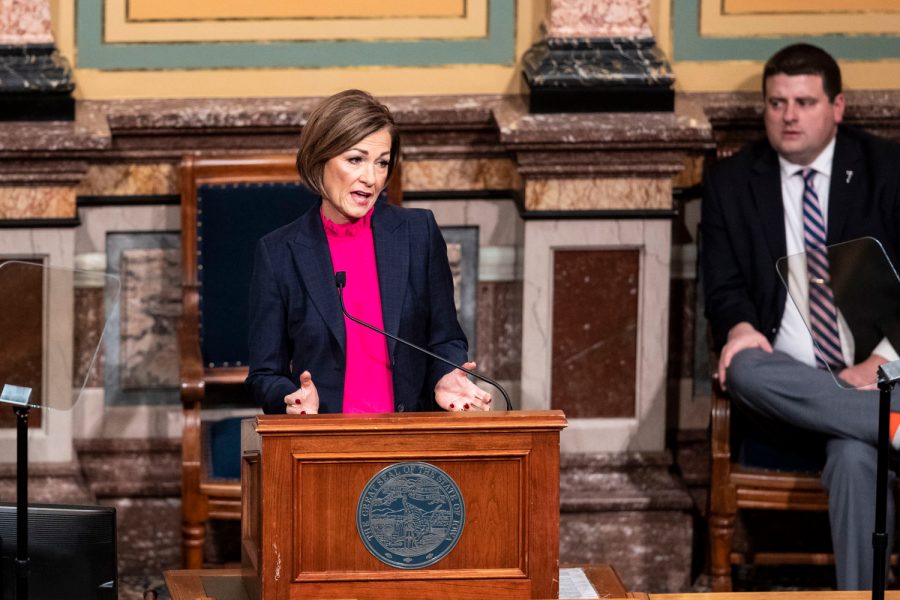Opinion | Current legislature stops teachers from accurately giving a spotlight to Black history month
With the bans on critical race theory,Iowa teachers are not able to fully teach Black history during Black history month.
Iowa Governor Kim Reynolds delivers the Condition of the State Address at the Iowa State Capitol in Des Moines, Iowa, on Tuesday, Jan. 11, 2022. During the State Address, Reynolds spoke about childcare, Iowa teachers, material taught in schools, unemployment, tax cuts, and more.
February 20, 2022
It’s Black history month, yet Iowa’s teachers can’t accurately teach Black history because of restrictive legislation.
In summer 2021, Gov. Kim Reynolds signed a bill that bans teaching of concepts she considers divisive. This includes teaching of inherent or systemic racism and sexism.
Reynolds is also against teaching the 1619 Project, and efforts have been made by Iowa republicans to ban this text from schools. The 1619 Project centers Black contributions in America’s progress revealing the truth of enslavement to modern day Black contributions and systemic barriers.
Critical race theory has also been a hot topic for Iowa Republicans. Reynolds described critical race theory as being about “labels and stereotypes, not education,” saying students will learn to “judge others based on race, gender or sexual identity.” At its core, critical race theory is about recognizing how racism is embedded in the systems we operate under. It has nothing to do with furthering or creating stereotypes.
These efforts to erase Black people from history in America is proof we need to do more to educate people on the truth behind our country’s history.
Reynolds’ past legislation is not the only thing working to stifle teachers’ ability to teach Black history. Recent book bans are doing this same thing, trying to remove Black identities from the education system.
In the past month, there has been continual discourse about banning certain books or penalizing teachers for teaching certain books in classes. Not coincidentally, almost all of the books deal with communities of color and LGBTQ+ narratives that would be perfect to spotlight during Black history month.
Some of the books discussed were *The Hate You Give* by Angie Thomas and *All Boys Aren’t Blue* by George M. Johnson. Both of these books center on very real experiences of Black youth and should not be targeted because the reality some students face is too harsh for others. Additionally, it’s important to remember six-year-olds are not the students being assigned books like The Hate You Give.
While educators are facing restrictions, in Hiawatha, elementary students heard from University of Iowa professor Venise Berry, who heads African American studies. She talked about her own experience and read about Liberia, a country in Africa founded by freed enslaved people.
Telling personal stories doesn’t necessarily cross Reynold’s boundaries for teaching about race. However, teachers should not have to worry about censoring the truth to protect white supremacy and fragility.
Students at Iowa City High School commented on what they have been doing in school for Black history month, “There are announcements with quotes from a Black person every morning but other than that there isn’t really anything happening,” Jax said. None of my teachers are really doing anything for Black history month.”
Vinyl, another student at City High said: “Our AP language teacher had us read essays from civil rights activists. We also had the opportunity to read other Black literature.”
Charlie, a student at Liberty High School, also made a comment saying “I have never been asked to read any Black literature in my classes.”
All in all, it seems like there is not a general effort to uplift Black history by the schools. However, it being Black history month there should be more effort put into uplifting Black students than protecting white fragility and false narratives.
Teaching about Black history is not about teaching white students to feel guilty. It’s about addressing a history that plagues and contributes to inequities Black Americans face today. In order to make the progress we need to, we have to recognize this history.
Columns reflect the opinions of the authors and are not necessarily those of the Editorial Board, The Daily Iowan, or other organizations in which the author may be involved.














